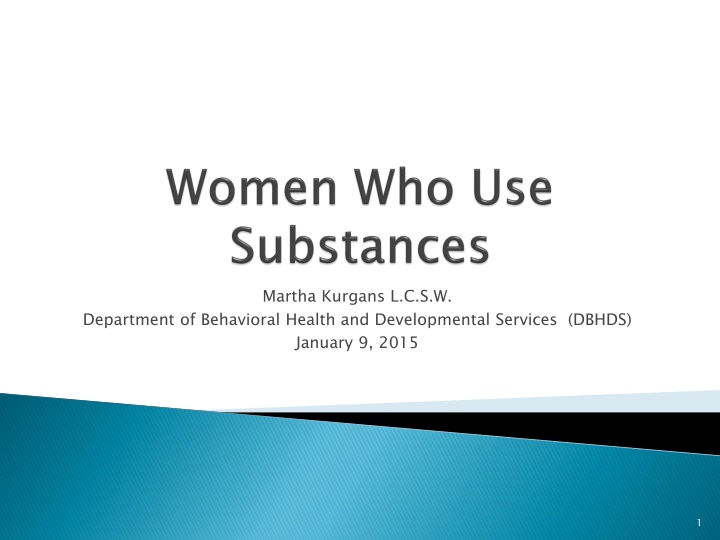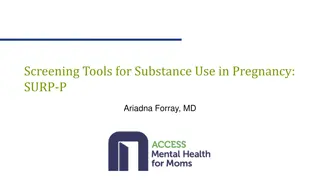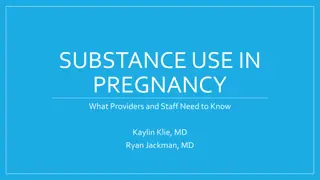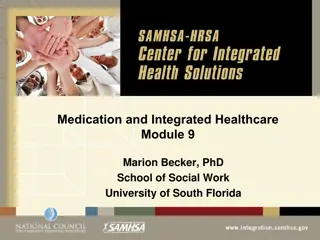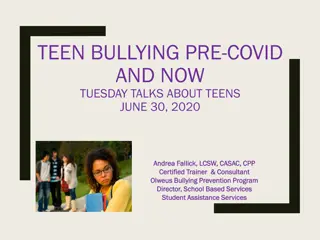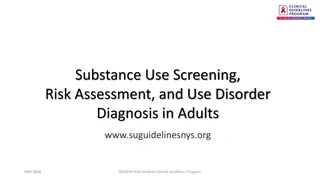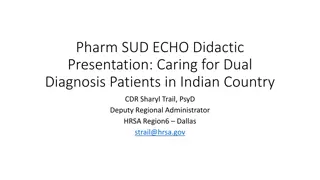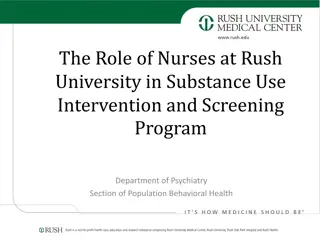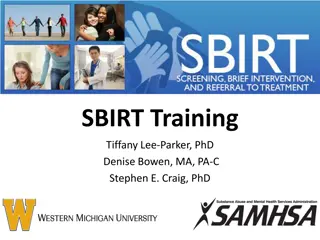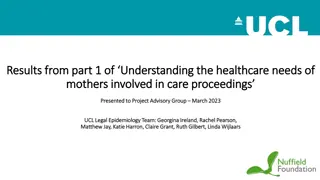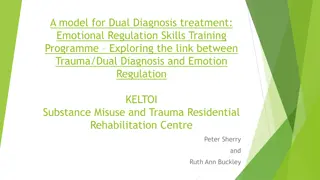Women's Substance Use and Mental Health
Explore the complex interplay between women's substance use, mental health, and societal factors. Discover how patterns of substance use impact women, the challenges they face, and the unique issues related to treatment and support services.
Download Presentation

Please find below an Image/Link to download the presentation.
The content on the website is provided AS IS for your information and personal use only. It may not be sold, licensed, or shared on other websites without obtaining consent from the author.If you encounter any issues during the download, it is possible that the publisher has removed the file from their server.
You are allowed to download the files provided on this website for personal or commercial use, subject to the condition that they are used lawfully. All files are the property of their respective owners.
The content on the website is provided AS IS for your information and personal use only. It may not be sold, licensed, or shared on other websites without obtaining consent from the author.
E N D
Presentation Transcript
Martha Kurgans L.C.S.W. Department of Behavioral Health and Developmental Services (DBHDS) January 9, 2015 1
Patterns of substance use (the how, what, why & where) Psychological differences & disorders How metabolize mood altering substances & physical consequences Social & cultural factors Consequences of their use Issues related to pregnancy & parenting Pathways to treatment 2
They impact on: The type of treatment and support services women need How we can identify women in need What providers need to do to engage women Challenges and barriers to getting women into treatment 3
Men Women Use in isolation / with partner Use in social situations Prefer alcohol & marijuana More likely use prescribed meds and Hard drugs Use impacts on social functioning (legal, financial / work) Referred by courts or work Use impacts on emotional & family functioning Referred by child welfare, medical providers or court 4
Significant rate co-occurring mental health disorders Most have a history of sexual/ physical/ and/or emotional abuse 50% 95% women in Tx report history of trauma Use to repress feelings of shame, self blame, low self esteem, experiences of trauma self medicate mental health concerns 5
In the U.S., women who use are more likely to: Be impoverished Lack medical coverage Have primary responsibility for supporting & parenting children/other family Have been introduced to use by a partner, family member or friend &/or involved in a relationship with someone who uses Experience greater stigma especially if pregnant Poverty, lack of social support -> increased social consequences 6
Addiction progresses more rapidly in women Women experience more serious medical consequences sooner - even when use less than men Research suggests women metabolize alcohol, cocaine and heroin differently than men do. Increased risk of STDs/HIV/ pregnancy Risks to baby associated with perinatal use 7
50% pregnancy unplanned; women often use before know they are pregnant. Any use during pregnancy is harmful to the unborn child. Risks to the child extend beyond delivery Pregnancy = window of opportunity. Most women want what is best for their baby. Those who continue to use may not understand risk, or more likely have a significant addiction and aren t able to stop without support Women don t acknowledge use due to stigma and fear they will lose custody of their children 8
Substance Not Pregnant Pregnant Cigarettes 24% 15.4% Alcohol 55.4% 9.4% Binge Alcohol (4 or more drinks in 2hrs) Heavy (binge use 5 x 30 days Any Illicit Drug 24.6% 2.3% 5.3 .04 11.4% 5.4% 9
Reluctant to admit use. Fear will lose baby or other children &/or suffer legal consequences Addiction + shame + history of trauma &/or MH issues make these women especially difficult to engage in treatment They are the clients most in need of welcoming services ! 10
U.S. NSDUH 2013 15.4% smoked 9.4% drank 5.4% used illicit drugs 15,687 tobacco exposed 9,575 alcohol exposed 5,501exposed illicit drugs VA PRAMS 2011-2012 8.3% smoked 11.5% drank 8,455 tobacco exposed 11,714 alcohol exposed Used During Pregnancy VA 2013 Births=101,863 11
Poor maternal-child bonding Developmental delays Impaired psychological, social &/or academic development Increased risk of neglect/abuse; more likely be exposed to potentially violent situations 12
If pregnant, interrupts /reduces substance exposure Ensures a safe environment for the child Opportunity teach Mom how to recognize & meet child s needs 13
Offer comprehensive SA treatment Incorporate supportive, non-judgmental approach Provide services that are both trauma informed & trauma sensitive Focus on relationships Ensure services are family focused services i.e. parenting / caretaking role should be routinely addressed as integral part of treatment Address treatment barriers e.g. childcare, transportation 14
Greater Stigma especially if pregnant Fear loss of custody of children Caretaking responsibilities Less likely be encouraged to seek services Lack resources (funding, insurance, childcare, transportation) Basic needs for self & children take priority Few programs offer services that are sufficiently intense and of necessary duration 15
Assistance meeting basic needs Safe and stable housing for self & children Assistance coordinating family s involvement with multiple service delivery systems e.g. child welfare, criminal justice, health, financial assistance etc Transportation Childcare 16
Federal Substance Abuse Prevention and Treatment Block Grant (SAPT BG) SAPT Women s Allocations = $4,595,501 SA State General funds Perinatal services = $1,237,366 Medicaid (outpt, IOP & Perinatal Residential) 2014 SA Pregnant Day/IOP treatment expenditures : $2,520 2014 SA Pregnant Residential treatment expenditures: $366,240 Insurance (Mental health parity required as of 2008) ?? Affordable Health Care Act?? 17
Gender specific services available at Virginias 40 Community Services Boards (CSB)s. Services vary depending upon CSB s funding & community resources PPW services are funded by federal Substance Abuse Prevention and Treatment (SAPT) which requires that subrecipients give pregnant women: Treatment priority Offer services within 48 hrs of request Provide interim services including referral to prenatal care Publicize these services to their respective communities 18
CSB services for pregnant & parenting women must be focused CSB services for pregnant & parenting women must be family focused and include: family and include: 1. 2. 1. Primary medical care for women 2. Gender specific SA treatment interventions 3. receive medical care 4. 5. 6. women are able to access services Primary medical care for women including prenatal Gender specific SA treatment & other therapeutic 3. Childcare Childcare so women can participate in treatment & 4. Primary medical care for children 5. Therapeutic interventions for children 6. Sufficient transportation and case management Primary medical care for children Therapeutic interventions for children Sufficient transportation and case management so 19
SAPT funded [6@$100,000 each($80,000/$20,000)] Blue Ridge Behavioral Health (Roanoke) District 19 CSB (Petersburg) Hampton Newport News CSB (Hampton Newport News) Rappahannock Area CSB (Fredericksburg) Region Ten CSB (Charlottesville) Virginia Beach CSB (Virginia Beach) SG funds [2@$125,000 each] Northern Virginia LINK (Alexandria, Arlington, Fairfax- Falls Church, Loudon and Prince William CSBs) Cumberland LINK (Cumberland, Dickenson and Frontier Health CSBs) 20
DBHDS Supported Residential Treatment Perinatal ($987,366 SGF) Southeastern Family Program, Hampton/Newport News (16 beds) Rubicon, Richmond (8 beds) Bethany Hall, Roanoke (2 beds) Women with Dependent Children ($500,000 SAPT) Rubicon, Richmond (24 beds/8 families) DBHDS Supported Residential Treatment Other women s SA residential services Demeter House (Arlington) PPW with children Bethany Hall (Roanoke) PPW with children Life Center of Galax (Galax) PPW but no children Other women s SA residential services 21
